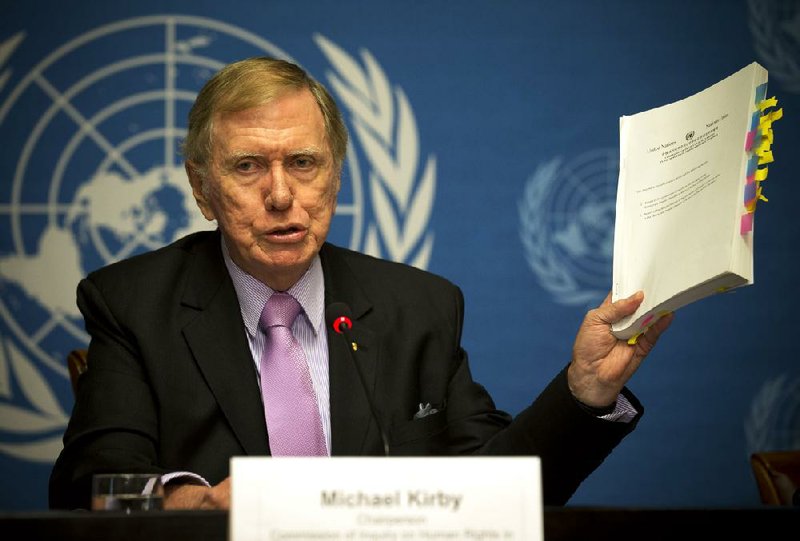GENEVA - A United Nations panel has served notice to Kim Jong Un, the North Korean leader, that he will potentially be personally held liable in court for purported crimes against humanity committed by state institutions and officials under his direct control.
A letter conveying this notice forms part of a report by the panel to the U.N. Human Rights Council, released on Monday after a year-long investigation.
The report is viewed by rights activists not only as the most detailed and authoritative body of data on the state of human rights in North Korea but also as a milestone in the international debate on that country, one of the world’s most reclusive and isolated.
In the Jan. 20 letter, the panel chairman, retired Australian Judge Michael Donald Kirby, summarized the investigation’s findings of crimes against humanity committed by officials who could be inferred to be under Kim’s personal control.
Addressing Kim, 31, Kirby wrote in the letter that his panel would recommend that the U.N. Security Council refer the situation in North Korea to the International Criminal Court to make all those responsible for crimes accountable, “including possibly yourself.”
“I hope that the international community will be moved by the detail, the amount, the long duration, the great suffering and the many tears that have existed in North Korea to act on the crimes against humanity,” Kirby said on Monday, speaking to reporters in the U.N.’s Geneva offices.
“Too many times in this building there are reports and no action,” Kirby said. “Well, now is a time for action. We can’t say we didn’t know.”
North Korea denounced the report, and the entire process leading up to it, as a fabricated concoction of lies and deceits by North Korea’s enemies, including South Korea and the United States.
A statement from the North Korean Mission in Geneva, quoted by Reuters, said that such rights violations “do not exist in our country” and that the findings are “an instrument of a political plot aimed at sabotaging the socialist system.”
The North Korean authorities repeatedly denied the panel’s request for permission to visit the country to investigate abuses. The report relied heavily on testimony from North Korean refugees, escapees and asylum seekers.
The panel’s 36-page summary report and a 372-page annex detail what the report describes as a wide range of crimes against humanity. The report also criticizes the political and security apparatus of the North Korean state, asserting that it used surveillance, fear, public executions and enforced disappearances“to terrorize the population into submission.”
“Systematic, widespread and gross human rights violations have been and are being committed by the Democratic People’s Republic of Korea, its institutions and officials,” the report asserted, referring to North Korea by its official name. The report stopped short of alleging genocide but specified among others the crimes of “extermination,” murder, enslavement, torture, rape and persecution on grounds of race, religion and gender.
The report also reported in detail on the abduction of foreign citizens, notably from Japan and South Korea, observing “these international forced disappearances are unique in their intensity, scale and nature.”
In many instances the abuses constitute crimes against humanity, the report asserted, adding “these are not mere excesses of the state; they are essential components,” and have been committed “pursuant to policies at the highest level of the state.”
Human-rights activists had pushed for the creation of the panel in a bid to broaden what had been the international community’s focus on North Korea’s nuclear program and bellicose security policies to the near exclusion of its human-rights record.
North Korea’s practice of what the report called “crimes that shock the conscience of humanity” for decades “raises questions about the inadequacy of the international community.”
“It really opens up a whole new chapter in the international reaction to North Korea,” Lee Jung-hoon, South Korea’s ambassador for human rights, said in a telephone interview. “It’s not just an investigation and a report and that’s the end of it. It’s giving a road map and blueprint to end this thing. There’s a very strong sense of urgency.”
There appears to be little immediate prospect of winning approval for International Criminal Court prosecution, however. Approval is necessary from the Security Council’s permanent members, which include North Korea’s longtime protector, China.
Still, Lee said, “just the fact that they are getting the vocabulary of crimes against humanity, the International Criminal Court and Kim Jong Un on the same page is a huge step forward in the debate on North Korean human rights.”
The panel also listed some other possible options for prosecution, including the formation of an ad hoc tribunal such as those convened to investigate crimes in the Balkans and Rwanda. It also called for the Human Rights Council to establish a structure to keep up the collection of evidence of human-rights violations.
“The U.N. has been more or less indifferent about these issues for six decades. The panel in trying to jump-start the reaction of the international community,” said Julie de Rivero, Geneva representative of Human Rights Watch. “Steps need to be put in place so that North Korea gets the message loud and clear that the issue won’t be ignored and it won’t just be the nuclear issue that triggers an international response.”
Front Section, Pages 1 on 02/18/2014


